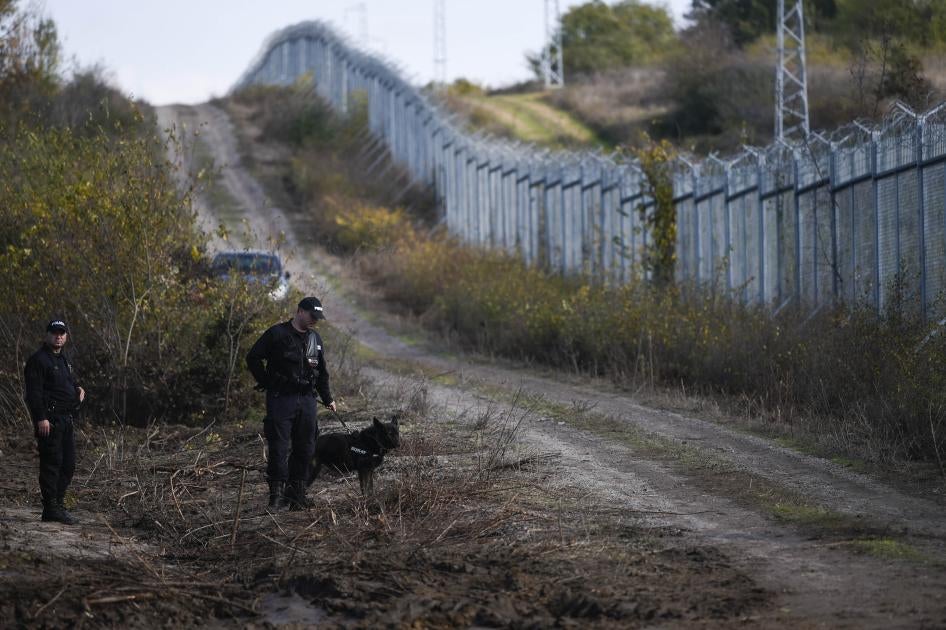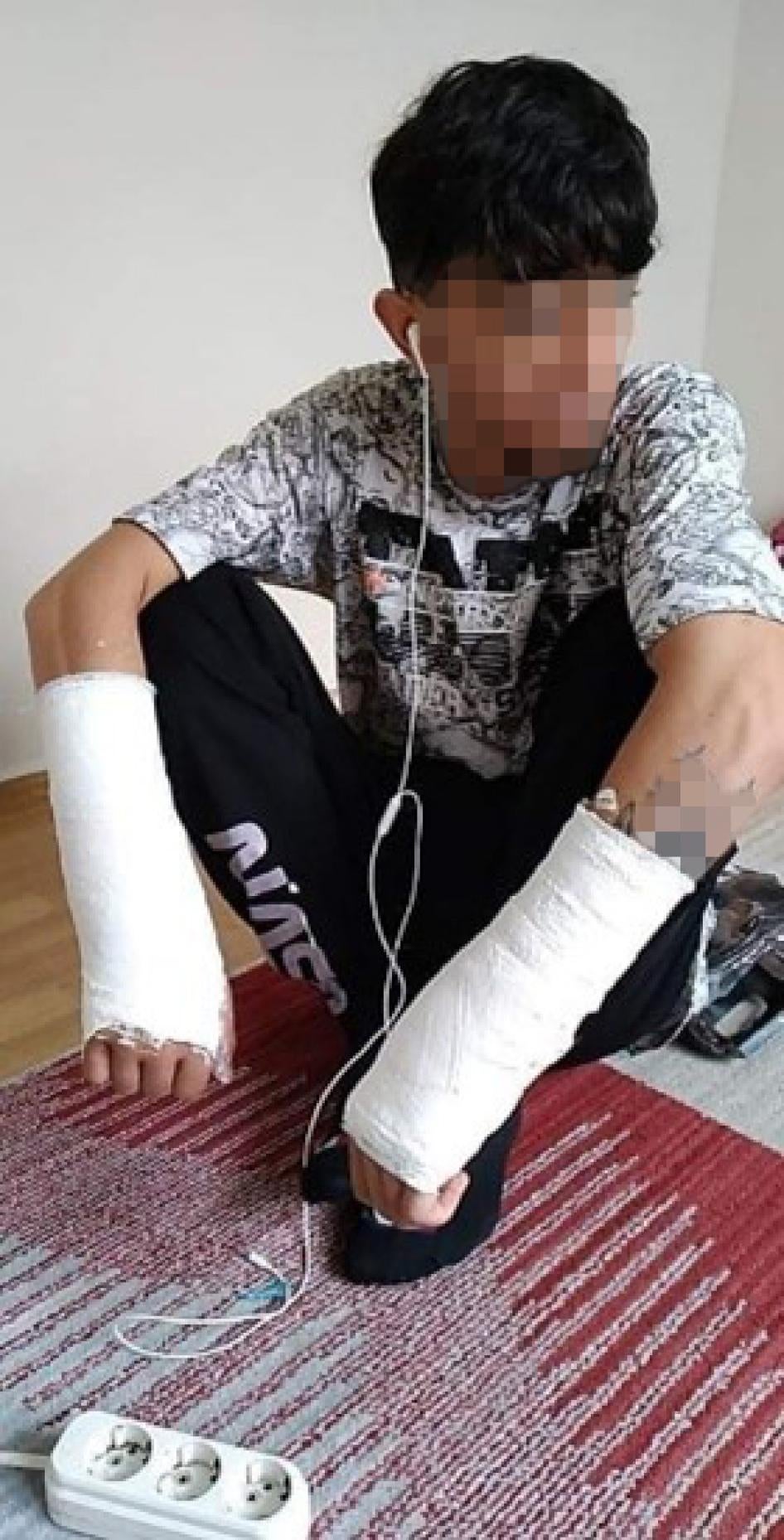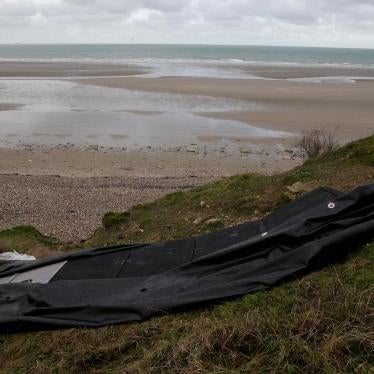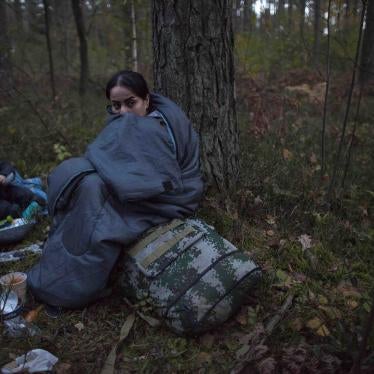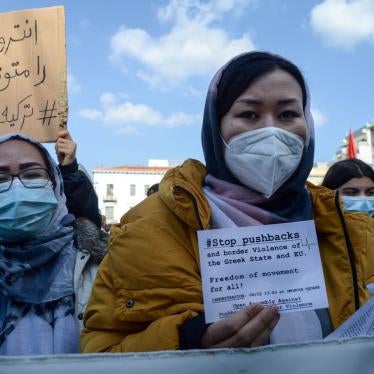(Brussels) – Bulgarian authorities are beating, robbing, stripping, and using police dogs to attack Afghan and other asylum seekers and migrants, then pushing them back to Turkey without any formal interview or asylum procedure, Human Rights Watch said today.
“Bulgarian authorities are brutally and summarily pushing back migrants and asylum seekers across the land border with Turkey,” said Michelle Randhawa, refugee and migrant rights officer at Human Rights Watch. “The European Union should ensure that Bulgaria immediately stops the illegal and dehumanizing pushbacks at its borders and allows asylum seekers access to fair asylum procedures.”
In July 2021, the European Court of Human Rights (ECtHR) unanimously ruled that the Bulgarian government had violated articles 3 and 13 of the European Convention on Human Rights, the prohibition against torture and inhuman and degrading treatment, and the right to a remedy when, in 2016, it pushed back a Turkish journalist to Turkey without a risk assessment or allowing him to challenge his removal. At the end of 2021, the Bulgarian Helsinki Committee reported there had been 2,513 pushbacks from Bulgaria, involving 44,988 people. In 2020, it reported that Bulgarian authorities pushed back 15,173 people.
Human Rights Watch interviewed 15 Afghan men between November 2021 and April 2022. They described being victims of 19 pushbacks by Bulgarian authorities from Bulgaria to Turkey. Seventeen occurred between October and April and two in the summer of 2021.
Fourteen of the fifteen men said that Bulgarian police, or men they believed to be Bulgarian police, beat them either when they were detained on Bulgarian territory, and/or in the course of forcibly returning them to Turkey. Ten of the men said Bulgarian authorities stole their belongings and stripped them of their clothes, in some cases leaving them without shoes, only in underwear and t-shirts in freezing temperatures. The man who did not report being beaten or witnessing beatings of others was traveling with his wife and three children at the time they were detained. He said they were taken directly to the border.
Twelve people said that Bulgarian police used police dogs when the migrants first encountered them. Five said that a police dog bit them or someone in their group, and that they were not moving when they were bitten.
“There was a man [in our group] who started speaking Bulgarian,” said one man who crossed the border with a group of around 25 men in March or April 2022. “That man had worked in Bulgaria for three or four years and that’s how he knew the language.… The police asked him questions … then they released the dog [on him]. He was begging in Bulgarian for them to stop the dog. [We all] saw the dog biting him, his hands were bleeding … after this attack, police were … scaring this person with the dog. The dog’s leash was in their hands, and they would pretend to release it.”
Twelve people interviewed said that the police took them directly to the border after detaining them, while three said police took them to a detention facility, where they spent between 24 and 72 hours before being taken to the border. The authorities gave none of them a chance to ask for asylum.
None of the three men who were taken to a taken facility before being pushed back to Turkey had access to an interpreter or were interviewed while at the detention facility. Two said that the police took their fingerprints but did not photograph them. One said the police photographed him but did not take his fingerprints.
Human Rights Watch sent a letter to the Bulgarian Ministry of Interior with the findings on April 28 asking for comment, but has not received a response.
Frontex, the European Border and Coast Guard Agency, maintains a presence in Bulgaria, and in 2016 reported that 192 officers and staff were deployed at Bulgaria’s borders with Turkey and Serbia. Two Afghan men interviewed described four separate encounters they had with Frontex officers while being detained by Bulgarian police. Both said the Frontex police presence did seem to have a deterrent effect on the abusive behavior by the police, but that the police became more abusive once the Frontex police were no longer there. The asylum seekers were pushed back once the Frontex officers had left.
On March 15, Human Rights Watch wrote to Frontex’s then-Executive Director Fabrice Leggeri about the Human Rights Watch findings involving Frontex knowledge of pushbacks of migrants and asylum seekers from the Evros region of Greece to Turkey.
On April 11, Frontex responded: “All officers taking part in Frontex operational activities must follow the Frontex Code of Conduct, which … states that ‘throughout their operational duties and within the confines of their mandate and powers, participants in Frontex operational activities commit to ensure assistance to, in particular, vulnerable persons and persons seeking international protection.’”
“All Frontex deployed officers have a clear responsibility to identify and refer the persons in need of international protection, medical assistance, unaccompanied minors, victims of trafficking in human beings, and other persons in a vulnerable situation to the national authorities for appropriate assistance.”
Leggeri resigned at the end of April after the European Anti-Fraud Office concluded its year-long investigation into allegations that Frontex staff, including Leggeri himself, covered up information that migrants were being pushed back from the land and sea borders of Greece to Turkey. The full report is not yet public.
Frontex has not responded to an inquiry about how many officers it currently has at the Bulgarian border.
Bulgaria should immediately halt all pushbacks from its territory, hold officials who abuse migrants accountable, ensure fair treatment, and provide access to asylum procedures for all who request it, Human Rights watch said. European institutions and member states should hold Bulgaria accountable for these abuses, and an independent border monitoring mechanism should be established to monitor and report on human rights violations on the Bulgaria-Turkey border. Frontex should internally investigate all allegations of failure to prevent illegal pushbacks of migrants and provide greater transparency about all internal investigations and findings.
“At a time when Bulgarian officials are welcoming Ukrainian refugees by disseminating information to them about temporary protection and living in Bulgaria, they are brutally mistreating Afghans and other asylum seekers at their border,” Randhawa said. “Bulgarian authorities should extend the same understanding and dignified treatment to all asylum seekers as they are doing for Ukrainians.”
Background on Bulgarian Border Pushbacks
Pushbacks violate multiple human rights norms, including the prohibition of collective expulsion under the European Convention on Human Rights, the right to due process in the International Covenant on Civil and Political Rights, and the principle of nonrefoulement under the 1951 Refugee Convention.
Bulgaria is also bound by EU law and its own Constitution to respect the right to asylum. The “right to asylum” is enshrined in article 18 of the EU Charter of Fundamental Rights, as amended by the 2007 Treaty of Lisbon. With the entry into force of the Treaty of Lisbon in December 2009, the Charter became legally binding on EU member states when they apply EU law and the right to asylum became an enforceable right under the EU’s legal order.
Article 27(2) of the Bulgarian Constitution binds the Bulgarian government to grant asylum, saying, “The Republic of Bulgaria shall grant asylum to foreigners persecuted for their opinions or activity in the defense of internationally recognized rights and freedoms.”
International standards and guidelines on the use of force by law enforcement officials apply to Bulgarian border police and soldiers exercising policing functions. UN Standards, alongside updated 2020 guidance based on a consultative process, state that law enforcement officials should use only use force as a last resort. Any use of force must comply with a series of principles including proportionality and necessity.
Recent guidance from the Office of the High Commissioner for Human Rights (OHCHR) on “less than lethal” weapons and a resource manual from the United Nations Office on Drugs and Crime (UNODC) for law enforcement officials specifically recommend that police dogs be trained and under effective control of a handler, including when not on a leash, as dog bites can cause serious or lifelong injuries to a victim and carry a secondary risk of infection.
The Bulgarian Police Code of Ethics and relevant national legislation set out tests of necessity and proportionality when police decide to use force. These rules and principles should apply to border policing. In all cases, Bulgarian police should comply with their international human rights law and constitutional obligations to ensure no one is subject to torture or cruel, inhuman, or degrading treatment. This obligation is absolute and applies in all circumstances.
On July 30, 2021, Bulgarian Interior Minister Boyko Rashkov said in a parliamentary session, “We are indeed seeing an increased migration pressure.” On August 31, the Bulgarian media reported that in the final two days of the month, almost 500 irregular crossings from Greece and Turkey had been stopped by Bulgarian authorities. This came after the government reported that from the beginning of 2021 to the end of July, 16,900 third-country nationals who had crossed the border irregularly were returned to neighboring countries.
Since the Taliban took control of Afghanistan in August 2021, the Bulgarian government announced it would deploy between 750 and 1,050 soldiers to the land borders with Greece and Turkey to carry out a “protection mission” and support 1,000 border police officers.
Human Rights Watch has been documenting Bulgarian authorities pushing back migrants and asylum seekers at the land border with Turkey since 2014. Other reports from nongovernmental organizations and media outlets corroborate the Human Rights Watch findings. The United Nations Refugee Agency (UNHCR) called for an investigation into the death of two Iraqis at the Bulgarian-Turkish border in 2015. In February 2022, the United Nations High Commissioner for Refugees, Filippo Grandi, cited a “disturbing pattern of threats, intimidation, violence, and humiliation” of “people being pushed back” on EU’s central and southeastern borders.
Methodology
Between November 2021 and April 2022, Human Rights Watch interviewed 15 Afghan men who described experiencing 19 pushbacks by Bulgarian authorities from Bulgaria to Turkey. Seventeen occurred between October and April and two date from summer 2021. In another case, a 14-year-old Afghan boy said Bulgarian police beat him and others in a group that was pushed back to Greece.
Although Human Rights Watch cannot estimate the total numbers of people involved in the pushbacks, they were all collective expulsions.
All but one of the interviews were conducted in Dari with the use of an interpreter, and one interview was conducted in English with the interpreter standing by.
Interviews were conducted by telephone in private settings – either completely alone or with the interviewee’s immediate family members present – with assurances of confidentiality. The researchers informed all interviewees about the purpose and voluntary nature of the interviews, and the ways in which Human Rights Watch would use the information. All interviewees were told they could decline to answer questions or could end the interview at any time. The researchers told interview subjects they would receive no payment, service, or other personal benefit for the interviews.
Violence and Abuse by Bulgarian Authorities
A 21-year-old man from Ghazni Province in Afghanistan said he attempted to cross into Bulgaria from Turkey on or around November 12 with four other men. He and his group became lost after walking for a day and a night, and eventually wandered up to the police station in a village. He said there was one policeman there who immediately called for backup. He said that the police, all wearing dark blue uniforms, beat him and his friends, and stole their money and bags.
The police then drove them to the barbed wire fence separating the Bulgarian and Turkish border, forced them to take off their clothes and shoelaces, and continued the beating. The police bloodied his nose and beat his face so severely that he temporarily lost sight in one eye. During the beating, the police pushed him into a trench, and he broke both wrists when he landed. “When they took us out of the car,” he said, “They told us to repeat, ‘No Bulgaria’ and until we repeated it, they kept beating us…. They sent us back only with underwear.”
Without documentation in Turkey, he was unable to seek medical attention from Turkish hospitals, but he told Human Rights Watch that he eventually found an Afghan doctor who treated him. He sent Human Rights Watch an x-ray of his broken wrists, as well as a picture of himself with casts on both hands and lower arms.
A 27-year-old man from Baghlan Province, Afghanistan, who crossed into Bulgaria in December with five other men said that after crossing into Greece from Turkey, he and his group walked for two days until they reached the Bulgarian border. They crossed and walked another hour before being detained by six Bulgarian police and three dogs. He said one of those dogs bit a man in his group who tried to run away, causing his leg to bleed. He described the police as being dressed in black uniforms with their faces covered. Four more police joined them and took him and his group directly to the Bulgarian-Turkish border:
They were kicking us like soccer balls.… They kicked me on every part of my body, I was just able to protect my head.... They were wearing … [heavy] boots … and the toe of the boots was made of steel.… On the border, they beat us again … and they told us, “Don’t come back again.”
A 25-year-old man also from Baghlan Province said that he crossed into Bulgaria with about 19 other men in December. After walking for two or three hours, they were detained by men he believed to be Bulgarian police wearing black uniforms with their faced covered:
The Bulgarian police were aggressive with us … they severely beat me [when we were arrested]. I fainted and … when I opened my eyes, we were in a detention center.… There was one Bulgarian guard giving me water.… The room was a container, there wasn’t enough air to breathe.… Each of us was taken to another room for fingerprinting, but they didn’t take our pictures.… They didn’t give us a chance to talk with them.… They took our belongings and some of our clothes. We were left with pants. They also took our shoes….
As a result of their beating, two of my ribs were broken.… From this place to the border, we walked 1 hour and 10 minutes. Since I couldn’t walk, two of my friends were carrying me on their shoulders. There were 14 police escorting us.… On the way, if they wanted to, they would just beat someone with the baton. They beat me three times with the baton. [At the border] they threatened us and said, “If you come again, you will face the same treatment.”
A 20-year-old man from Paktia Province in Afghanistan, who was detained by Bulgarian police at the end of November 2021, told us of his experience at the detention facility where he was told to put his fingerprint on a document that he could not understand:
There were some migrants speaking in English asking for asylum, but the police didn’t respond positively, they pushed us back and said go sit down. They didn’t take pictures of us, but there were papers and we had to put our fingers on it as a signature. They didn’t tell us anything [about what the papers said].… They didn’t give us a copy. Before leaving the camp [to go to the border], they took my bag, phone, clothes, and shoes, and I was left with shorts.
A 25-year-old man from Mazar-e Sharif Province, Afghanistan, said that 10 minutes after he and his group of 30 people, including children, were detained by Bulgarian police around February 16, 2022, two German Frontex officers arrived in a jeep. He said that these Frontex officers did not heed their pleas for asylum, or to keep them from being summarily expelled:
The two German police were wearing a blue uniform.… I saw the German flag on their uniform.… I spoke to one of them in English. He told me he was a German officer and he asked me, “Why did you come illegally?” I told him there are problems in our countries, that we are refugees, and that Turkey isn’t safe for us. When I told him all of that, he said, “It’s illegal that you came this way.” The German police stayed for one hour, and [while] the Bulgarian police [were preparing] to take us to the border, they left.… When [Bulgarian police] took us to the border, that’s where they beat us … and took our clothes.
A 22-year-old man from Nangarhar Province, Afghanistan, who attempted to enter Bulgaria in summer 2021 in a group of 25 men, said that two German police arrived at the scene about 15 minutes after Bulgarian police detained them. “I saw the German flag on their shoulder … and POLIZEI was written on their uniform and on their car,” he said. “The German police stood there and watched the Bulgarian police put us in the car [to go to the border], and then they left.… [At the border] it was the Bulgarian police who took our belongings … and our clothes … we were left with shorts and t-shirts, they took our shoes as well.”
That same man made another attempt to enter Bulgaria in November 2021 in a group of about 36 people, including four women from Iraq and Syria and their three children. After walking for two hours, he said they encountered Bulgarian police. While being detained, he witnessed male Bulgarian police physically search and pat down women in his group before they were taken directly to the border with Turkey:
Their [Bulgarian police] behavior was bad, even with the women.… They searched the women same as men.… There were no female police with them, all the police were men … the police touched [the women] with their hands all over their bodies.… When the women were trying to stop them or say something [to protest], the police put his finger to his lips to signal to them to stop talking.
International guidance calls for border control forces to ensure that women officers interview and search women migrants.
Twelve people said that Bulgarian police used police dogs when they were detaining them. Five of them said that a police dog bit them or someone in their group who was either sitting or standing but not moving. In four other accounts, dogs bit people who were running.
A 14-year-old Afghan boy from Kapisa Province, Afghanistan, who is not included in our count of migrants pushed back to Turkey because Bulgarian police pushed him across the border into Greece, also reported brutal treatment using police dogs. He said Bulgarian police caught him and the rest of his group of about 25 people after they had walked for four nights in Bulgaria after entering from Greece:
Four police and a dog [caught us]. Their uniform was blue and had POLICE written on it…. They beat me, but because I was a child, they only beat me with their fist and a stick three or four times; I was not beaten as badly as the men. The police released the dog to bite people. The dog ran toward me, but I hid behind the police. I saw the dog biting other people. It seemed worse than death to be bitten by a dog like that. The beatings went on for 20 to 25 minutes, people with broken noses and broken heads. Some people were beaten severely.
They did not ask me anything. They did not separate children … in fact they broke one of their arms and didn’t do anything to help.... They called for a car and continued to beat us in the car. They beat me on my head and hands, my fingers were injured. They took us to the Greek-Bulgarian border, took our clothes, made us lay down, and continued to beat us. They made us walk down a hill to Greece.
